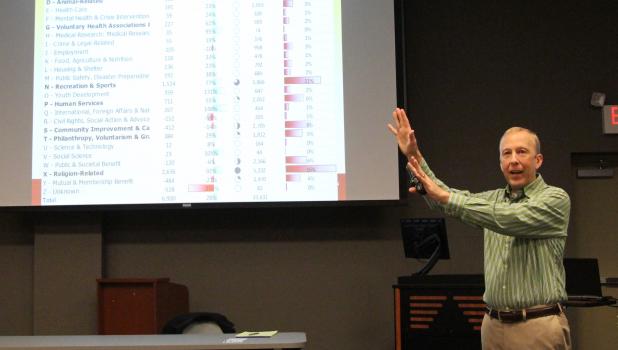Rural communities: Changing, not dying
People in small towns can stop talking negatively about what things their town has lost or what it used to be like. According to Ben Winchester of the University of Minnesota Extension, the changes in rural Minnesota are almost all microcosms of globalization.
“Rural is changing, not dying,” Winchester told a crowd in Staples on Jan. 24, part of his presentation called Rewriting the Rural Narrative, held at NJPA. “If your community loses a store, it is an indication of something bigger happening in the world,” he said. For every store a small town loses, a similar store in a big city closes for the same reasons, Winchester said.
Winchester used statistics to describe some of the changing patterns. He showed that lower birth rates are the main reason for declining enrollment in rural schools.
Statistics also dispelled some of the myths about rural communities. Agriculture and manufacturing are not the primary driver of the rural economy any more, the economy is much more diversified.
The biggest myth was that small towns are dying. Winchester’s research shows that most people want to move out of big cities, and prefer small towns and outer suburbs, and they are gaining population.
He said the main reasons people move to small towns are: 1. A simpler pace of life; 2. Safety and security; and 3. Low housing costs. According to his research, finding a job doesn’t even make the top ten reasons for moving to a small town. “They may be leaving their career or underemployed, yet quality of life is the trump card,” Winchester said.
He called the migration patterns a “brain gain” for small towns, and essential for the vitality of the town. “The only way to be certain of vibrancy is to circulate people,” said Winchester.
Putting all the statistics together, Winchester said communities should be advertising the individual things that people like to do, to get like-minded people to move to their town. “Find out what people want as a person. It’s not a workforce, it’s a live-force, because they want to live there,” he said.
Winchester also addressed the myth that civic engagement is shrinking in the U.S. He said during the last census period, the U.S. gained 10 percent in population, but gained 32 percent in the number of non-profits. Even the most rural communities that had a slight population loss still had nonprofit increases of 15 percent.
The number of high-income nonprofits in Todd County rose from 34 to 94 during the census period. “These are really good indicators for the county,” said Winchester. “The percent change in nonprofit assets is through the roof in Region Five.”
The increase in nonprofits also creates a need for more leaders in each community. Winchester said one in 28 people in Todd County are needed to fill nonprofit boards.
The one big change in civic volunteering is what types of activities attract people. Winchester said the traditional organizations with broad focuses are being dumped for narrow-focus groups that better fit the individual’s interests. “If you are interested in young people joining your organization, find out what they want to do,” said Winchester.
He said younger people are more interested in decentralized ways of organizing, and prefer to do it on social media. “You have to put a lot of trust in models of organizing that are decentralized,” said Winchester.
For traditional organizations, Winchester suggested that they eliminate some of their activities and give newcomers a clean slate to help decide what to focus on. “Interests change every year but organizations do not,” he said. Another suggestion was that groups can gain new members starting with small requests to help with one activity or another. “Get to know people as a person,” he said.
Small towns need to embrace the newcomers that are continually arriving and find out what they want out of their town. “They are building their community, they want to live here today, for what you are, not what you were. They don’t want to hear about what used to be here, so watch how you talk about your town. Cut people off when they start talking about anecdotes that enforce the negative rural narrative,” said Winchester.
The presentation was sponsored by Todd County Citizens Against Drugs, with a second presentation in Long Prairie on the same day.

